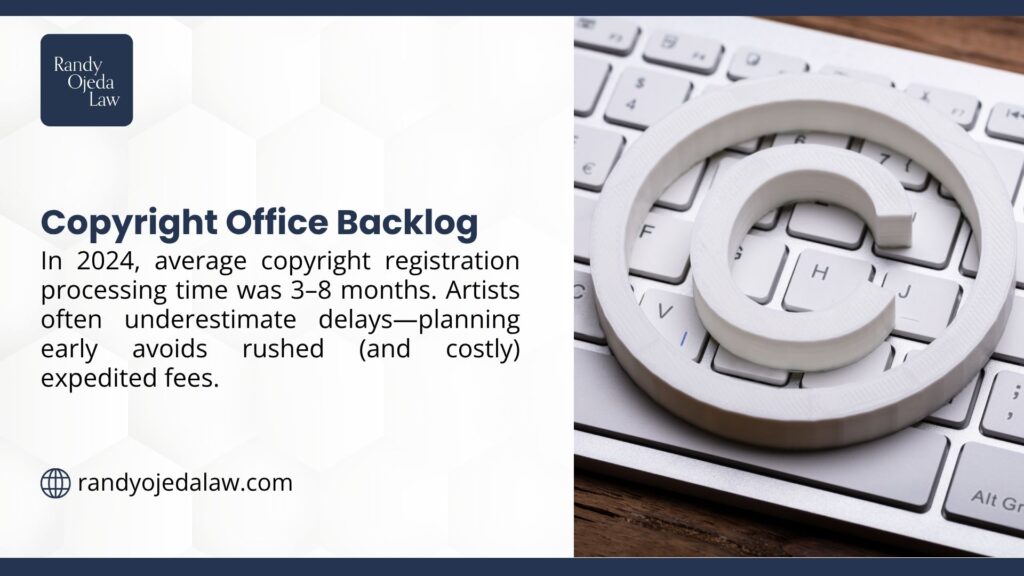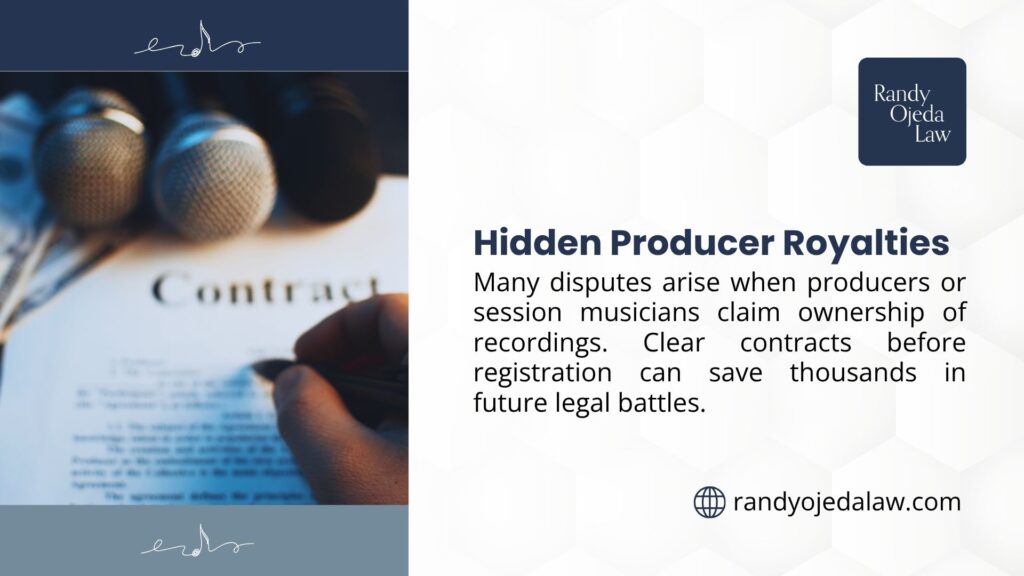Getting an album copyrighted isn’t as straightforward as most musicians think. There’s the actual filing fee to consider, but that’s honestly just the beginning.
The U.S. Copyright Office processed over 443,000 sound recording claims in 2023 alone, and most artists had no clue what they were getting into cost-wise until they were already knee-deep in the process.
They vary wildly depending on how many songs you’ve got, who wrote what, and whether you’re doing this yourself or getting help. Some artists end up spending $65 total. Others drop thousands. The difference usually comes down to understanding what you actually need versus what you think you need.
What the Copyright Office Charges for Albums
The base cost for copyrighting music through the U.S. Copyright Office is $65 for a standard application. But albums work differently than single tracks, and that’s where things get interesting.
There’s this option called GRAM (Group Registration of Works on an Album of Music) that lets you register up to 20 songs for that same $65. All the songs need to have at least one author in common, and the same person or entity needs to own the rights to everything. For solo artists or bands where everyone shares credits across the board, this is perfect. For collaborative albums with different writers on different tracks, not so much.
If the album hasn’t been released yet, there’s GRUW (Group Registration of Unpublished Works). That one costs $85 and covers up to 10 unreleased tracks. A lot of artists use this for demos or when they want protection before the album drops.
The single author application runs $45, but it only works if you’re the sole creator, the sole owner, and it’s not a work-for-hire situation. Paper filings cost $125, which is why pretty much everyone files electronically.
| Registration Type | Cost | Number of Works | What You Need to Know |
| Standard Application | $65 | 1 work | Most common for single works |
| GRAM (Album) | $65 | Up to 20 tracks | Published album, needs common author |
| GRUW (Unpublished) | $85 | Up to 10 tracks | Pre-release protection |
| Single Author | $45 | 1 work | Solo work only, strict requirements |
| Paper Filing | $125 | 1 work | Why though? |
The Part Most Artists Miss About Music Copyright
When you record a song, you’re actually creating two different copyrights. There’s the composition (the song itself—melody, lyrics, arrangement) and the sound recording (your specific recorded version of it).
Both need separate registrations for full protection.
So that $65 GRAM registration? You actually need to file it twice—once for the compositions and once for the sound recordings. For a 12-track album where you wrote and recorded everything, you’re looking at $130 total in federal fees. Not terrible, but definitely more than the $65 a lot of people budget for.
This gets messier when different people wrote different songs or when producers claim ownership stakes in recordings. Suddenly you can’t use group registration for everything, and costs start multiplying.
This is where bringing in a music contract lawyer makes sense for sorting out ownership before you file saves money in the long run.
Extra Costs
Special handling is what the Copyright Office calls expedited processing, and it costs $800 per claim. If you’re facing a lawsuit or have a publishing deadline that can’t move, you might not have a choice.
Paper applications cost almost twice what electronic ones do. The Copyright Office really, really wants everyone filing online, and they’ve priced it accordingly.
If your application gets rejected and you want them to reconsider, that’s $350 for the first appeal, $700 for the second. Mess up the paperwork enough times and you’ve just spent more on appeals than the album cost to record.
Need extra copies of your registration certificate? Those are $55 each. Most people don’t think about this until a licensing deal pops up and the other party wants official documentation.
Paying Someone Else to Handle It
Copyright registration services charge anywhere from $99 to $300 on top of the federal fees. They’ll fill out the forms, submit everything, and handle any follow-up with the Copyright Office. For straightforward albums, this might be overkill. For complicated situations with multiple collaborators or samples, it’s often worth it just to avoid rejected applications.
Actual music lawyers typically charge $250 to $500 for copyright registration work on simple projects. More complex catalogs cost more. The advantage here is that you’re getting actual legal advice about ownership structures, licensing strategy, and what happens if someone infringes.
Working with a music contract review lawyer before registration often catches ownership issues that would cause problems down the line. Better to fix that stuff before filing than after.
When You Register Matters More Than You’d Think
Registration timing affects way more than just when you get your certificate. Register before publication or within three months after, and you’re eligible for statutory damages and attorney’s fees if someone infringes. Miss that window and you’re stuck proving actual damages, which is a nightmare.
Statutory damages range from $750 to $30,000 per infringement. For willful infringement, it can go up to $150,000. Without timely registration, you can only recover what you can prove you lost plus whatever the infringer made.
That’s why smart artists build copyright costs into their album budget from the start. The enhanced legal protection you get from registering early is worth way more than the filing fee.

DIY vs. Getting Professional Help
The Copyright Office’s online system works fine if you know what you’re doing. Plenty of independent artists file successfully without help. The instructions are there, the forms are (mostly) straightforward, and you save money by not paying anyone else.
The catch is that the system assumes you understand copyright terminology and know which form type applies to your situation. First-time filers make predictable mistakes: wrong application type, incomplete authorship information, incorrect deposit materials. These errors cause delays, rejections, and sometimes require paying for reconsideration.
Professional services justify their fees by preventing those mistakes. For artists releasing multiple albums per year, establishing a relationship with someone who handles this stuff regularly makes the whole process smoother. For a one-off album with simple authorship, DIY probably makes sense.
The complexity of the project should drive the decision. One artist, one album, straightforward ownership? Do it yourself.
Multiple collaborators, samples, licensing deals, producer agreements? Get professional help.
Learning how to negotiate a music contract often reveals complications that affect how copyright should be handled.
What About International Copyright?
U.S. copyright registration protects work in the United States. But thanks to international treaties, particularly the Berne Convention, American copyright is recognized in 179 countries automatically. No separate filings needed in most cases.
Registering with the U.S. Copyright Office creates a public record that supports enforcement internationally. For most independent artists distributing through major platforms, U.S. registration plus solid distribution agreements provides enough protection without extra territorial filings.
Some situations do require additional registrations in specific countries. This usually comes up with international label deals or territorial licensing arrangements. Those registrations vary by country and typically need local legal representation, which adds cost. But it’s not something the average independent artist releasing through Spotify and Apple Music needs to worry about initially.
Costs
Preparing proper deposit copies sometimes requires technical work. The Copyright Office has specific format requirements for digital deposits. If your files aren’t in the right format, you’ll need conversion services. Physical deposits for certain registration types mean duplication and shipping costs.
Administrative time adds up too. Gathering information about every songwriter, producer, and performer; making sure all the details are correct; managing correspondence with the Copyright Office – this takes hours. Hours that could be spent making music or promoting the album.
Record-keeping systems to track registrations, certificates, and important dates create ongoing work. Not expensive exactly, but necessary for managing a professional music career. When licensing opportunities come up or infringement issues pop up, having organized documentation makes everything easier.

What People Get Wrong About Copyright Costs
The biggest misconception is thinking the cost applies per song rather than per album when using group registration.
Artists budget $65 per track when they could protect 20 tracks for $65 total. That misunderstanding causes people to either avoid copyright registration entirely (thinking it costs thousands) or spend way more than necessary by registering tracks individually.
Another confusion point: automatic copyright versus registration. Copyright automatically exists when a work is “fixed in tangible form”—recorded, written down, whatever. But automatic copyright doesn’t give you the legal advantages registration provides.
The public record, statutory damages, attorney’s fees – none of that comes with automatic copyright. The modest registration cost buys substantial benefits that automatic protection alone can’t deliver.
Some artists think copyright requires annual renewal or maintenance fees like trademark sometimes does. For works created after 1978, U.S. copyright lasts for the author’s life plus 70 years.
Copyright and trademark get confused too. Album titles, band names, logos – those need trademark protection through a completely different process with different fees.
Building Copyright Into Your Album Budget
Smart album budgets include a line item for legal and administrative costs from the start. Usually 1-3% of the total production budget, which easily covers copyright registration plus basic legal review.
For a standard 12-song album using GRAM registration (compositions and recordings), budget $130-$250. That covers federal fees plus professional review if needed. Compared to what gets spent on studio time, mixing, mastering, and promotion, it’s not much, but the protection it provides lasts way longer than most promotion campaigns.
Artists planning multiple releases might look into Copyright Office deposit accounts. These allow prepayment and simplified transactions, though they require minimum deposits that might not make sense for everyone.
Integrating copyright planning into the album timeline prevents rushed, expensive last-minute filings. Building registration into the production schedule as a standard step, like mixing or mastering, normalizes it as part of professional release protocol rather than an optional extra.
Distribution agreements should specify who handles copyright registration and who pays for it. Don’t assume the label or distributor is taking care of it unless that’s explicitly stated in writing. A music contract negotiation lawyer can ensure these terms are clear and favorable.
Get Your Album Protected the Right Way
Copyright costs seem straightforward until you’re actually doing it. The registration process has enough moving parts that mistakes are easy, and those mistakes can compromise protection or require expensive corrections. Strategic timing, proper method selection, and accurate filings maximize the legal advantages registration provides.
Randy Ojeda Law helps musicians navigate copyright registration and broader intellectual property protection without the confusion or unnecessary expense. Whether it’s a first album or an extensive catalog, getting professional guidance ensures proper protection without administrative headaches or wasted money.
Copyright registration protects the time, money, and creative energy invested in making the album. Contact us to discuss album copyright needs and develop a protection strategy that actually makes sense for the specific situation.

